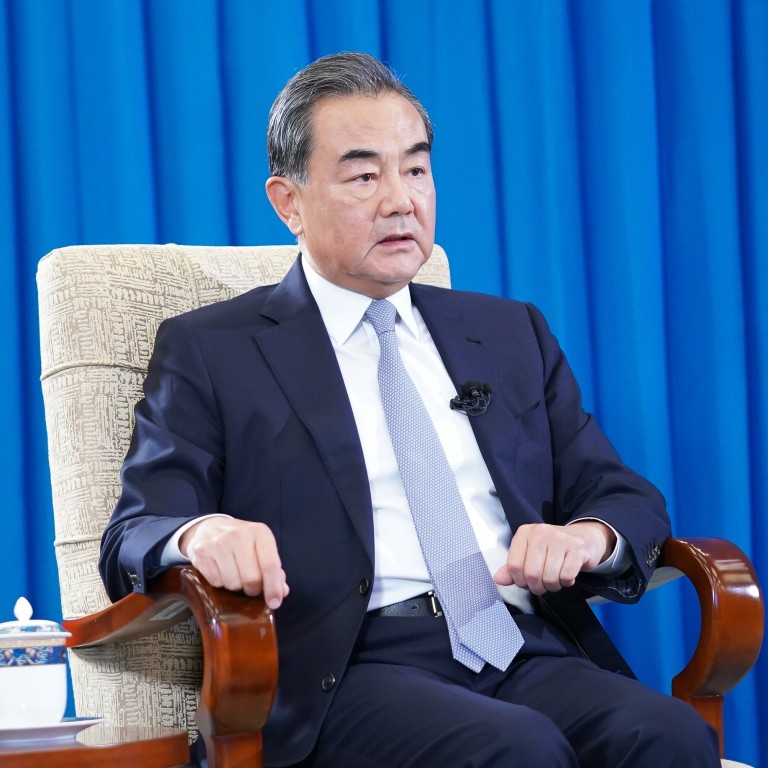
‘Damage control’ at heart of Chinese Foreign Minister Wang Yi’s mission to Europe
- Leading diplomat’s five-nation tour expected to focus on 5G and Huawei as more countries ban Chinese technology giant
- Beijing’s hard line on Hong Kong and its handling of the coronavirus pandemic have also drawn European criticism
China’s foreign minister will begin a five-nation “damage control” tour of Europe on Tuesday and is expected to meet French President Emmanuel Macron and Dutch Prime Minister Mark Rutte.
Chinese foreign ministry spokesman Zhao Lijian on Monday said Wang would visit Italy, the Netherlands, Norway, France and Germany from Tuesday to September 1. It is Wang’s first overseas trip since the coronavirus outbreak.
Zhao said China and Europe should work together to revive the global economy and protect multilateralism. China hoped Wang’s visit would further the progress of both sides’ political and economic agendas, as well as their work on stabilising supply chains after the pandemic, he added.
Italy urged to treat China fairly as Beijing escalates charm offensive
Lucrezia Poggetti, an expert on EU-China relations at the Mercator Institute for China Studies, said Wang’s visit would be a “damage control exercise”.
“Beijing’s main goal is to prevent the creation of a united transatlantic front against China, particularly on 5G,” she said.
None of Wang’s destinations will overlap with those of US Secretary of State Mike Pompeo’s trips to Europe over the past month – which saw him visit Austria, Britain, the Czech Republic, Denmark, Poland, and Slovenia – as part of Washington’s effort to persuade Europe to take a tougher line on the Chinese Communist Party.
The 27 EU foreign ministers – plus EU foreign policy chief Josep Borrell – have agreed to hold talks with Pompeo to discuss relations with China, despite their overall disagreement with US President Donald Trump’s Europe policies.
Trump’s election opponent, Joe Biden, has vowed to work with like-minded allies in handling the world’s second biggest economy.
Against the backdrop of a possible realignment of US-EU relations, President Xi Jinping is expected to hold a special summit with some of the EU leaders and heads of government in mid-September. Wang, for his part, is expected to focus on EU-China cooperation after the pandemic, analysts say.
“Wang will be nervous to see whether Beijing can still count on Rome, and particularly … Di Maio for unquestioned support as US-China tensions escalate and as the EU strives to pursue a more robust policy towards China,” Poggetti said. “He might end up disappointed.”
Wang will have a similar focus on 5G in Germany, where Chancellor Angela Merkel is facing increasing pressure to ban Huawei from the lucrative 5G networks.
Can EU-China trade ties outlast Angela Merkel?
“Beijing’s aggressive crackdown in Hong Kong came as a shock to many capitals, including Berlin, where momentum is now building against Huawei’s inclusion in the German 5G network,” said Noah Barkin, an expert on Europe-China relations at the Rhodium Group. “It is in the process of losing Europe.”
Huawei has already been wholly or partially banned in the US, Britain and France, leaving Germany as the only big market in the West to leave a door open to the Chinese giant. US authorities accuse Huawei of cyberespionage, a claim Huawei and the Chinese government have rejected.
A source close to the French presidency confirmed the planned meeting between Macron and Wang to the South China Morning Post, adding that the information was being kept tightly confidential as Chinese officials hoped to avoid protests.
A high-ranking German diplomatic source, who had not been briefed on the visit, said Wang would normally not be received by Merkel, citing the difference in their ranks.
EU says Chinese state media distorted remarks in diplomatic meeting
Wang’s visit to the Netherlands follows a blow to the Dutch reputation within the EU after Rutte insisted on scaling down a popular financial package for member countries hit by the pandemic.
While in Norway, Wang is likely to reaffirm China’s commitment to “normalised” relations with Oslo. Beijing reacted strongly to the Oslo-based Nobel Peace Prize committee’s award for Chinese political dissident Liu Xiaobo in 2010, and the two countries only mended ties in 2016.

